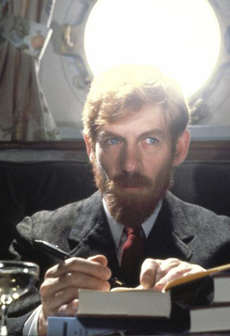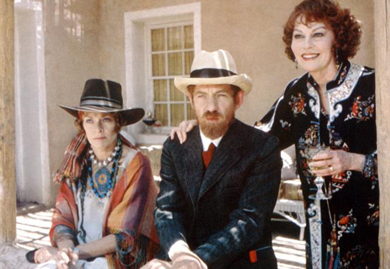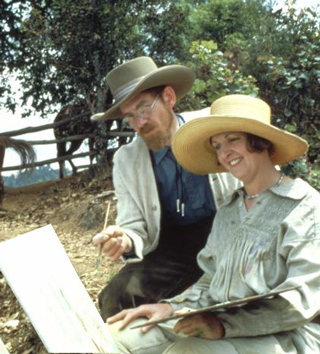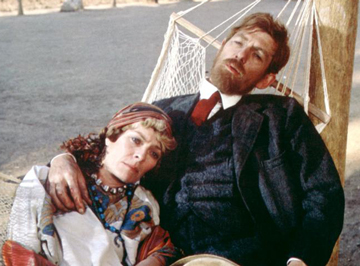
 |
|
|
|
Priest of Love from 1981 deserves a major re-evaluation. This biographical movie about the last years of 'notorious' author D.H. Lawrence is a welcome surprise, an intelligent and engaging look at the writer, his loving and loyal life with his wife Frieda and his globetrotting literary adventures. The excellent cast members are close lookalikes for the famous personages they are playing. Ian McKellen gives one of the best filming portrayals of a writer I've seen, while Janet Suzman is riveting as his courageous wife, a woman who threw off the bonds of convention when doing so was much more daring. The film does not exploit its subject, a major cultural sensation of the 1920s. Kino International's new Blu-ray makes the 30 year-old picture look brand new. 
Director Christopher Miles (The Virgin and the Gypsy) has a firm handle on all aspects of the production. The story follows its characters around the world, without turning into a travelogue. A prologue during WW1 shows the Lawrences being harassed by the British Army. D.H. (McKellen) has married the German Frieda (Suzman) a choice that targets them for special treatment. Later in the 1920s, the couple, along with their painter friend Dorothy Brett (Penelope Keith) takes a break from the persecution of special Scotland Yard literary consultant Herbert Muskett (John Gielgud) and accept the invitation of patroness Mabel Dodge Luhan (Ava Gardner) to live in New Mexico. D.H. resents the situation while Frieda rebuffs the American woman's interest in sleeping with Lawrence: Frieda is not only the 'right' woman for Lawrence, she has left her family and children to run away with him. In Mexico D.H. is diagnosed with tuberculosis; the couple retires to Italy so he can continue to write. There they entertain and meet various celebrities as well as Frieda's daughters; D.H. turns to painting as well. As he grows more sickly, they work to display his paintings in London, and to publish Lady Chatterley's Lover on the sly in Italy. 
As much a movie about a successful marriage as a literary biography, Priest of Love sees the stubborn D.H. and the feisty Freida (she calls him Lorenzo) feuding and chafing against one another, but remaining true in spirit to one another. Lawrence's reputation as a writer of obscene books makes them cultural outlaws in much of the world. News reporters interview him with less respect than they'd give a gangster, but his books keep selling well even if they have to be smuggled into England under false dust jackets. As famous lovers the Lawrences aren't Bohemians. He came from a family of poor coal miners, as we see in flashbacks to scenes that are more or less right out of Sons and Lovers. She's from German aristocracy; one of her relatives was Baron von Richthofen. Although she can no longer go back to her German family the Brits consider her a suspicious alien. The Lawrences don't practice free love, although they aren't entirely faithful to each other in bed. Their traveling companion Dorothy Brett is almost stone deaf. D.H. almost sleeps with Dorothy in a rather amusing counterpoint to Frieda's more conventional affair with an Italian nobleman. Alan Plater's fine screenplay presents D.H. as a temperamental man with little patience for conventional people; even the eccentric Mabel Luhan, who clearly wants to bed him, gets on his nerves. (This is one of the few Ava Gardner late-career roles that are really worth seeing.) But D.H. is committed to his writing and to his wife. For his final novel he tells Frieda to write down everything she knows and feels about lovemaking, so he can incorporate it into the erotic detail: he says that all the lovers he has written about are Frieda, but also himself. D.H. is serious about the power of literature to bring people back to their sexual selves. His arch-critic/censor in London cannot bear to imagine the idea of a wife, a child or a servant even reading such vile ideas. 
The movie has many impressive scenes, one of the best being a confrontation in a hallway. Frieda shouts through a door at D.H., who is coughing but won't let her in. D.H.'s sister chooses this moment to vent her contempt at Frieda, emphasizing the unforgivable act of abandoning one's children. One of Frieda's grown daughters appears at this moment, to say she doesn't feel abandoned because, well, here she is. The movie doesn't belabor its points, but we realize that Freida's girls certainly didn't suffer materially when she left. D.H. feels no remorse for talking her away ... he needed Frieda in his life, and that was that. If she felt loved at home she wouldn't have come. Ian McKellen is bright and intense, without playing D.H. as eccentric or 'clever'; he seems as if he'd be good company provided you didn't get in his way. There's no agonizing about writer's block; one day when it looks like he's disappeared, his wife finds him up in the attic of their small Italian villa, happily writing away. Janet Suzman's Frieda is the real gem of a performance, an aggressive and self-assured woman who is also loving and understanding. With her excellent German accent, the character reminds me a bit of Viveca Lindfors, who would have been perfect for the role perhaps twenty years earlier. If the entertaining Priest of Love was given a decent release in Los Angeles, I never heard about it. Strong female roles are so hard to come by that I should think Ms. Suzman would have been a good contender for an acting Oscar. 
Kino International's Blu-ray of Priest of Love is a strikingly attractive HD transfer that brings out the life and sunshine in cinematographer Ted Moore's images of London, Santa Fe, Oaxaca, and various places in Italy. The original music score by Francis James Brown and Stanley Joseph Seeger, known as Joseph James, sounds great on the vibrant audio track. In addition to some trailers, deleted scenes and outtakes the disc includes a thorough documentary on the making of the picture, The Way We Got It Together. It uses excellent behind the scenes film and biographical research on the author. Actress Penelope Keith serves as hostess. Priest of Love was filmed in many of the exact places where D.H. Lawrence lived in the years before his death.
On a scale of Excellent, Good, Fair, and Poor,
Priest of Love Blu-ray rates:
Response from director Christopher Miles: Dear Glenn Erickson, Having just read your great review of my film Priest of Love, I'd like to thank you for your generosity and care, and you are the first person to single out one of my own favourite scenes of Frieda confronting her daughter Barbara outside her room. Although it was released in L.A. in 1982, little was spent on it. BUT perhaps it is worth pointing out that this version was made by myself in 1985 when I cut 26 minutes out of the 1981 version you mention in your first line, which I feel greatly improved the film. This 1985 version has never been shown in the USA until now. Many thanks again and kind regards, Christopher (July 12, 2011)
Reviews on the Savant main site have additional credits information and are often updated and annotated with reader input and graphics. Also, don't forget the 2010 Savant Wish List. T'was Ever Thus.
Review Staff | About DVD Talk | Newsletter Subscribe | Join DVD Talk Forum |
| ||||||||||||||||||